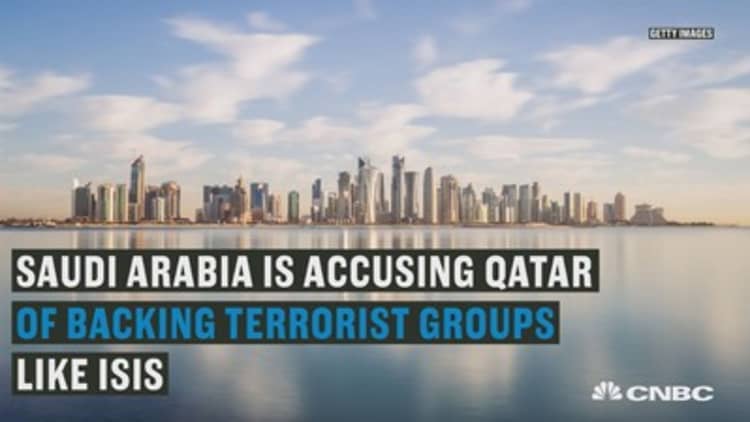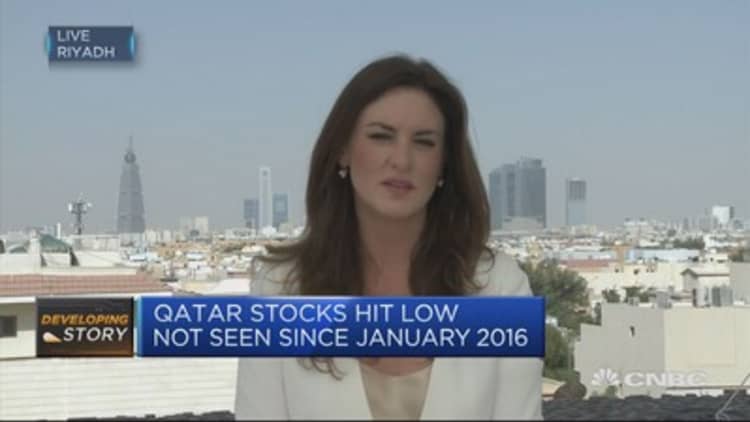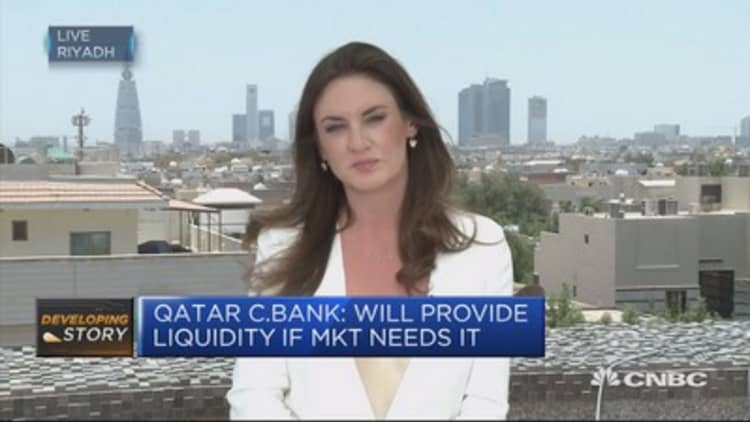
A number of Arab states have severed ties with Qatar accusing it of supporting terrorism but this puts the United States in a tough spot.
The U.S. has located one of its largest air base operations in the desert outside the Qatari capital of Doha which is home to close to 11,000 U.S. military personnel. However, with the recent visit of U.S. President Donald Trump to the Middle East, ties with Saudi Arabia have strengthened.
The Al Udeid U.S. Central Command (CENTCOM) military base in Qatar was set up in 2003 after it was moved from the Prince Sultan Air Base in Saudi Arabia. The base, which boasts a long runway of 12,500 feet, is an important facility for the U.S. as it can accommodate up to 120
"There is a danger that if the West were to get involved in this then it will be a great deal of meddling," Simon Mabon, lecturer in international relations of the Middle East at Lancaster University, told CNBC Monday.
"This (GCC) is an autonomous body albeit a body that has increasingly over the past decade or so been increasingly reliant upon security and I think in the past week or so, with President Trump's visit to Saudi Arabia we thought there was this greater unity between the GCC states and between the West, particularly the U.S. and the GCC."

Trump's focus on Saudi Arabia
Mabon further explains that Trump during his visit focused his attention on Saudi Arabia and the UAE perhaps ignoring Qatar suggesting Trump's policies are directed towards the two countries at the expense of Qatar and other weaker states in the region.
But the current standoff between GCC nations and Qatar has put the U.S. in a tough spot for a number of reasons. During a press conference on Monday in Sydney, U.S. Defense Secretary James Mattis and U.S. Secretary of State Rex Tillerson offered U.S. support in brokering a solution between the feuding nations.
"I think what we're witnessing is a growing list of some irritants in the region that have been there for some time, and obviously they have now bubbled up to a level that some countries have decided they needed to take action in an effort to have those interests addressed," Tillerson said according to local Australian media. "We'd certainly encourage those parties to sit down together and address these differences."
A number of analysts have said that the U.S. is trying everything possible to bring peace to the region since it relies heavily on these nations including Qatar, in its fight against the Islamic State.
Will Arab rift hurt U.S. operations?
Earlier this week, the Air Force Secretary Heather Wilson told media that a diplomatic split between Qatar and other Arab nations won't affect the war against the Islamic State and other U.S. operations.
The U.S. military also lauded Qatar for its "enduring commitment to regional security" and said U.S. flights out of Al-Udeid airbase in Qatar were unaffected by the Gulf diplomatic crisis.
"We've seen no impact to our operations and all flights continue as planned," Lieutenant-Colonel Damien Pickart, a spokesman for US Air Forces Central Command, told Reuters.
"The United States and the [anti-Islamic State of Iraq and Syria, US-led] coalition are grateful to the Qataris for their long-standing support of our presence and their enduring commitment to regional security."
The U.S. military's Central Command also said that it has "no plans to change our posture in Qatar".

Rising tensions in the region
On Monday, Saudi Arabia, along with the United Arab Emirates, Yemen, Libya, Bahrain and Maldives (the only non-Arab nation) severed their ties with Qatar. Gulf Arab states and Egypt have long resented Qatar's support for Islamists, especially the Egyptian-based Muslim
The coordinated move, with the Maldives and Libya's eastern-based government joining in later, created a dramatic rift among the Arab nations, many of which are in OPEC.
Announcing the closure of transport ties with Qatar, the three Gulf States gave Qatari visitors and residents two weeks to leave. Qatar was also expelled from the Saudi-led coalition fighting in Yemen.
"There has been a
He further added that this tension stems from two reasons - first, the Qatari support for Islamists across the region with whom many states have had a complicated relationship.
"I have been talking predominantly about the Muslim

The second reason, according to Mabon is Qatar's relationship with Iran. "These are longstanding tensions that have been bubbling under the surface but with the reported comment from Qatar's Emir Sheikh Tamim bin Hamad Al Thani last week where he was alleged to have said positive things about Iran and negative things about other states was seen as an opportunity for the other powerful Gulf states like Saudi Arabia and the Emirates to actually clamp down on Qatar."
But while the issue has been largely attributed to the rise of Islamist terrorism in the region, Mabon warns that this should not be purely boiled down to religion. Religion is an important factor, he warns but "this is a political struggle between the Saudis and the Iranians and of course the UAE, Bahrain, and Egypt all fall in line with this."


